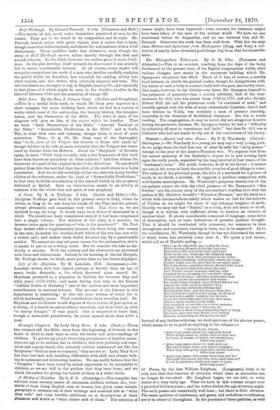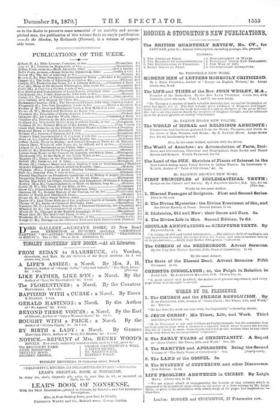Pograv.—Muriel, and other Poems. By F. E. Weatherly. (Oxford :
Shrimpton.)—Mr. Weatherly is a young, we may say a very young, poet.. So we judge from the fact that one of what he calls his "early poems belongs to the year of the Austro-Prussian war. We suppose that from the serene maturity of the Bachelor's degree he is now looking back upon the early youth, separated by the long interval of four years, of his- "freshman's term." His youth, however, is all in his favour ; it makes. one see in his verse at least the possible promise of good things to come. The subject of his principal poem, the love of a mermaid for a prince of earth, is, we think, a mistake. It suggests a perilous comparison with well-known masterpieces. Mr. Weatherly's gorgeous description of the
palaces cannot vie with the vivid pictures of Mr. Tennyson's "Sea. Fairies," nor his piteous story of the sea-maiden's fruitless love with the. pathos of Mr. Matthew Arnold's "Forsaken Merman," nor his story as a whole with the marvellous reality which makes us feel for the sorrows. of Undine as we might for those of any unhappy daughter of earth.. Shortly, we may say that "Muriel," as a story, does not touch us at all, though it is written with sufficient pOwer to awaken an interest of another kind. It shows considerable command of language, some force- of description, and, at least, indications of genuine poetical thought. That it should be overloaded with ornament, too sensuous in tone- throughout, and sometimes wanting in taste, was to be expected. As to. the versification, Mr. Weatherly, though he has not discovered the secret- of blank verse, has certainly come near it. We quote a few verses, which tell us of Muriel's ending:—
" Then, as the ship-bells 'gan to ring the hour,
Thrice kissing Roland on his lips and eyes, Passed to a still spot of the ship, and leapt Down to the sea; while gay the shipmen sang On their bright deck their greetings to the dawn, With voice unwitting ; and yonder, where she leapt, Nought might you see, save that in one small space The foam shone somewhat whiter, flushed with dawn.
And on the good ship flew across the seas!
And Muriel's sisters watched, until the sails Gleamed but as gleaning of a sea-bird's wings Faint in the distance; and then homeward sank, Weeping, &down the tremulous blue waves.
But, home being reached, when Roland did not sect Among the other maidens Muriers face, And no one any certain knowledge had Touching her hap ; and minding in what wise Her coming was and now her going, he deemed He had seen a spirit ; nathless, for the love Of all the sweet time past with her, now gone, Albeit a spirit raised a costly tomb,
And mourned, as one who for A sister mourns,
Saying, 'Alas, my sister!' whilo far off, From dawn to dusk, from glimmering dusk to dawn The foam, that once was Muriel, ever rocked Restless, unknowing he did mourn for her."
Instead of any further criticism, we shall quote one of the shorter poems, which seems to us as good as anything in the volume :—
‘` AFTER LONG YEARS.
"After long years—alone the high gods know What things await us, bright days or dark woe, Or fame, or shame, or hopes, os coward fears, After long years "After long years—alone the high gods see The end of great vows, now heard trustingly; What hope will grasp (hope that our life endears), After long years! - "After long years—who seeks what then will be? The gods, who know, are they more glad than we? If now be gladness, death may come, or tears, After long years!"
Of Poems, by the late William Leighton. (Longmans), little is to. said, now that that function of criticism which aims at correction Can no longer be exercised. Mr. Leighton began, we are told, to write. verses at a very early age. What we have in this volume ranges over a period of thirteen years ; and the writer died at the age of twenty-eight. The early poems are remarkably well done ; but there is little advance. The same qualities of tenderness, and grace, and melodious versification are to be observed throughout. In the presence of these qualities, as well as in the desire to preserve some memorial of an amiable and accom- plished man, the publication of this volume finds an ample justification. —In the Shadow, by Hellmuth (Provost), is a volume of respect- able verse.



































 Previous page
Previous page